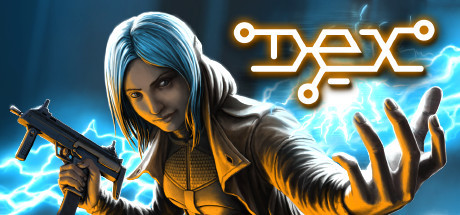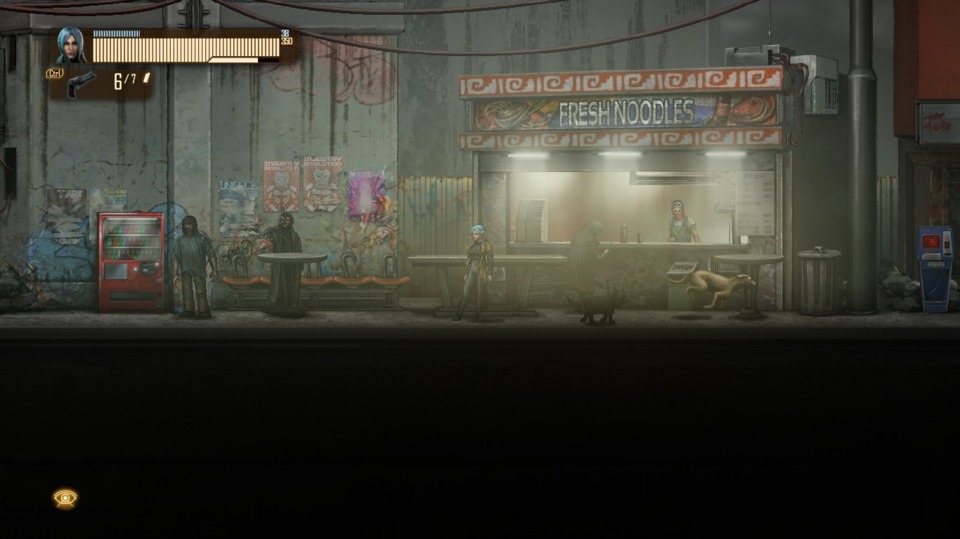Indie Game of the Week 117: Dex
By Mento 1 Comments

While I don't mean to drag Dex in particular, there's a certain familiarity to cyberpunk's conventions that makes it hard for any true-blue genre homage to really subvert or surprise any more. It almost always culminates in some manner of ghost in the machine twist, or a shadowy scientist villain that purports to move humanity to the next evolutionary level, or a massive corporation that seeks to entirely dominate the flow of information in this particular sci-fi world's equivalent of cyberspace. Some, like Dex, feature all three. At least I can say it does it masterfully enough, within a gameplay framework that I found pretty compelling.
To rewind a moment, Dex is a 2D action-adventure game featuring the blue-haired eponymous protagonist: a normal woman who finds herself on the wrong side of an all-powerful clandestine cabal of powerful people called The Complex, and in her escape finds herself allying with a few figures in the underworld hacking community, including the enigmatic "super hacker" Raycast. From there, Dex plans her next moves against The Complex all the while seeking answers. To stop there would be to sell the game short though: it feels like the game's biggest inspirational draw is Delphine's Flashback: The Quest for Identity, which also had a mystery narrative that it found plenty of time to side-line for other objectives and stories across its metropolis setting. In fact, I'd say there was a little bit of both Flashback - the combat, the platforming, the focus on detailed worldbuilding and character animations - and Ion Storm's Deus Ex, in that creating a multi-faceted hacker/warrior can open a lot of proverbial and literal doors to whatever the immediate objective might be.
Dex proves herself a versatile agent, able to remotely hack into systems like cameras and turrets (and eventually people, presumably through some kind of neural implant). She can use this to side-step some of the more gruelling combat encounters, or use stealth to quietly take down opponents before she's spotted, or fight it out with a selection of melee attacks, or whip out a piece and start blasting fools away. While still an Indie game that lacks the wide versatility of its AAA open-world brethren, Dex does a fine job presenting players with multiple approaches to any problem. That's not just in the combat encounters either; resourceful players with alternative character builds might find numerous ways to complete a mission through charisma or subterfuge, with the best outcome often requiring the most work to achieve. Dex creates its moderate-sized city of Harbour Prime with plenty to see and do if the player wanted to give themselves every advantage available for the challenging story missions to come, kitting themselves out with many powerful augments or simply ensuring they have all the top-of-the-line hardware, software, and street wear.

While I didn't care for the combat so much - it's hard to be accurate and slick in a 2D action game with keyboard controls, which appeared be the only option barring some Joy2Key commotion - the fact that I could do as little of it as I wanted by stunning enemies or getting the drop on them made that aspect of the game palatable. Likewise, the inevitable hacking mini-game, which here follows the most common representation of cyberspace infiltration as a top-down dual-stick shoot 'em up, also had its annoyances - I really didn't care for the "black holes," which frequently appeared on the screen too late to avoid - but was perfectly serviceable once you stuck a few upgrades on there to make things easier on yourself.
The true strength of the game is in its worldbuilding and mission/level crafting. The alternate solutions, branching paths (well, to a limited extent), character dialogue, quest log text, background lore, and interstitial cutscenes were all well-realized and delivered. The localization was decent enough too; especially for an Indie game developed in an ESL country, where costly localizations are often a low priority in a limited budget. Though it doesn't take long to cross the breadth of Harbour Prime, it has a surprising amount of content packed away in its nooks and crannies, including a few well-hidden secrets here and there. It felt like a lived-in city, even if you only ever saw a cross-section, and I could imagine sequels exploring it further.
It might not be the most wholly original game from a narrative standpoint, but it's a tale well-told with a lot of player-determinant wriggle-room. The gameplay systems, while not exceptional, do fine enough work buoying the parts of the game that shine. I think if you grew up with the deliberate action gameplay and atmosphere of Flashback, or fell in love with the cyberpunk genre via Deus Ex or Shadowrun (or one of the many movies and books in that genre, for that matter), or are just a fan of action-adventure games and RPGs that respect the player's agency and imagination when it comes to how they approach a situation, I'd recommend giving Dex a shot.
Rating: 4 out of 5.
| < Back to 116: Eschalon: Book II | The First 100 | > Forward to 118: Chaos on Deponia |
